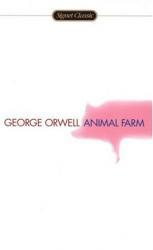
"Animal Farm" by George Orwell is about a seemingly normal farm that turns against their farmer. The animals take over the farm with the help of their leaders who are pigs. After all the humans are gone from the farm they continue under the rule of the pigs and create a system of rules to follow as a guideline for their new life. Everything goes well until one of the pigs, Napoleon, uses the dogs he trained to remove the other leader, Snowball, from the animal farm. With Snowball gone Napoleon takes complete control of the farm. He alters the rules made by Snowball, abuses his power, and makes poor decisions that negatively affect the other animals. One of their rules/guidelines was that humans were evil and not to be associated with.
Napoleon breaks that rule many times starting with making a trade of wood with another farm run by a farmer. They get scammed from the exchange with the human, but that doesn't stop Napoleon from dealing with humans. He goes to the extent of not telling the fellow animals the truth and putting all pigs above everyone else. From there things get progressively worse until Napoleon eventually befriends the humans along with the other pigs. They become so much like the humans that it gets to the point that the pigs are basically humans.
I would recommend the book. "Animal Farm" is interesting and in my opinion is in a sense satire, so I really enjoyed it. I read this book because I was planning on reading 1984 by the same author for a BTS theory and wanted to read other books by George Orwell. I kind of could relate to some of the animals because when they disagreed with Napoleon they brought up good points, but no one listened to them. The ending is very surprising and the book isn't predictable.
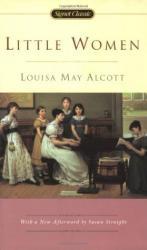
Little Women is a classic piece detailing a few years in the life of the March family. It is a beloved tale and for good reasons. This book shows the true inner workings of a family during the civil war and how love is stronger than even death. I really enjoyed Little Women because it included the historical details of the time that I find interesting, such as: having home servants even when in poverty, the intricacies of the dress, and social commentary. Little Women shows the true heart of sisterhood and friendship, along with the bonds made between parents and children. Through thick and thin, the March sisters are there for each other. Truly a delightful read for anybody.
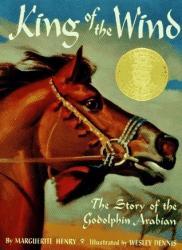
The book, King of the Wind, is a lovely story about a horse and his master. The connection between Sham, the horse, and Agba, a boy, is focused upon during the book, and the author certainly created something special.
The characters are decently developed, but the connections between characters are much better. The setting of the book is also quite unique and fits well with the story. It's more than just a classic horse story. Overall, I would recommend this book to anyone, as it's a pretty quick read and a great book.
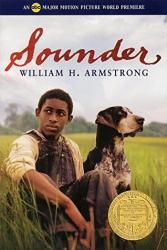
The book, Sounder, is a great read. While it is a short read, it packs a powerful punch. The only reason I could really no like the book was that it does get to a be a cliche "dog story" at times. The characters are pretty well developed, and the story does get very dark. The multiple ongoing conflicts also captivate the reader. While its sort-of a children's book, the book also does have some cool underlying themes that the reader can pick out.
Overall, I recommend this book to anyone, as its quick and phenomenal read.
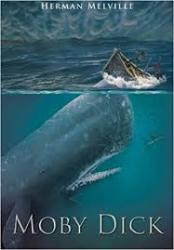
Moby Dick is a classic piece of literature, an iconic masterpiece. The story, once it pick up, is extremely engaging and interesting. The characters, such as Ishmael and Captain and Ahab, all exude personality and uniqueness. Plus, it has one of the greatest antagonists in all of literature: Moby Dick himself. I thoroughly enjoyed this novel from beginning to end. There are some downsides, such as the language of the seamen being somewhat hard to grasp, and the several chapters describing whaling or the anatomy of whales being completely pointless. However, these do not detract too much from the overall experience, and the novel is still an exceptional one. I would recommend this to anyone who is looking for a good novel to read, or anyone who has a passion for the ocean.
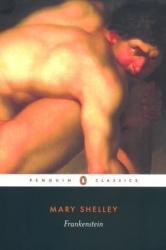
The classic tale of mystery and horror is also one that is an extremely entertaining read. While it may not be the scariest novel ever, the mere ideas that it presents are certain to make one a bit uneasy. The plot is iconic: Victor Frankenstein, aspiring philosopher and scientist, creates a horrifying monster out of dead bodies and reanimates it from the dead. The monster then goes on a murderous rampage after being rejected by his very creator. The novel is very good, and the message it presents, of not overreaching for knowledge, is a timeless one. The only downside to this icon of horror is that some chapters tend to drag, and have little purpose. However, this is not a huge detriment since the rest of the novel is so entertaining. I would recommend to thriller or horror enthusiasts.
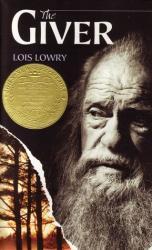
In the story "The Giver", the main character Jonas lives in what he thinks to be an utopia until he receives knowledge that only him and another person in the community hold. With this knowledge he realizes that his community lacks so much that things must change. Jonas decides to rebel against the guidelines with the other person in the community that holds the information he does which is The Giver. Jonas leaves the community by simply walking out of the borderlines and as a result the community receives the change Jonas and The Giver wanted. The book does end on a cliffhanger, which I did not like and what happens to Jonas and his escape partner is not definite. I read this book because it was what we were reading for the unit at my school in advanced language arts. I did not like the book. I didn't like the characters or the setting. "The Giver" is in a genre of books that I do not usually read and I think that is why I was not fond of it. The characters are not relatable in my opinion but to other people they might be. The plot of "The Giver" was disappointing. In general I just really didn't care for the book, but it wasn't the worst book I have read this year.
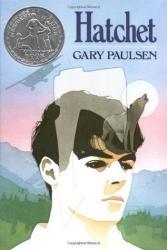
The award winning book by Gary Paulsen, Hatchet, is about a boy named Brian
whose parents are divorced. Right before, Brian gets on the plane that would
take him to his Dad’s house, his mother gives him a hatchet. While flying
over the 1000s of miles of forests in Canada, the pilot has a heart attack
and dies. Brian is forced to fly the plane into a lake in the middle of the
forest. Somehow he survives the crash, but now he is stranded in the
wilderness. He must survive against the harshness of nature with only his
mind and the hatchet to help him.
The realistic scenarios make the reader feel like they are trapped in the
forest with Brian. It was interesting to think about what would have happened
if he did not have the hatchet with him and the reader wonders what they
would do in Brian’s place. Would they be able to survive until help came
and make life or death decisions?
Hatchet is actually the original book in what Paulsen turned into a five book
series. I would recommend reading the whole series, it really deepens the
view of the story. My personal favorite is the second book, Brian’s Winter,
but the entire story is definitely worth reading. 8th Grade.
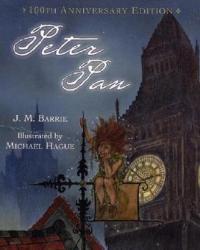
I LOVED this book! Although it was written a long time ago by an unsuccessful playwright, J. M. Barrie perfectly captured the imagination and creativity of young children. The reason he was disliked in his time was because he never really grew out of his kid-self. Which, I think, I think is where the inspiration for Peter Pan came, “the boy who never grew up”.
But anyways, Wendy and her younger brothers are born into a family that struggles financially but are obsessed with appearing rich to their wealthy neighbors… a common trend, even today. But Wendy and her brothers are whisked into a world where imagination runs wild-- the land that is hidden in all children’s minds, the one that is different for every child, Neverland.
What I love about this book is the constant thread of hidden and discreet themes about humanity, ones that continue today. It also taps into a child’s world of freedom, imagination, and oppression from adults. One of the most heartbreaking chapters is at the very end, when Wendy grows up, forgets about Peter, and gets lost in the adult world. But she has a daughter, Jane, and Jane is a kid, so she can imagine and believe in Peter Pan. Naturally, Peter Pan never really hit it off in it’s time, because of the controversial thoughts, and the point of view from kids.
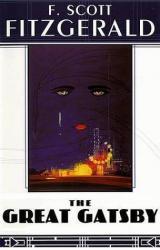
I thought this book captured an element in life that writing doesn't normally follow. While most books talk about the underprivileged, or those trying to overcome a great challenge, this book spun a tale about glamorous cocktail parties, elegant evening wear, the enticing, almost seductive society of wealth. Nick Carraway moves into a house next to Gatsby, an extravagant, self-made millionaire in the 1920's, and is thrown into the fast-paced and whirling word of millionaires and all their expensive friends.
But Gatsby has a secret, buried under fancy cars and fizzy drinks: he is still in love with Daisy, the wife of Tom Buchanan. In his attempts to cultivate an affair with her, Nick documents the heart-wrenching, and frankly, very interesting, journey of a man who realises money can't buy him love. -Jordan, 8th grade Your Name: Jordan T, 8th grade
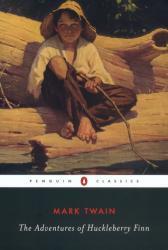
The classic tale "Huckleberry Finn" is about a young boy and his adventures with a slave named Jim amidst war and racism. I hated this book for two reasons. Firstly, the plot doesn't seem to go anywhere. It seemed that Finn and Jim just wandered aimlessly around, befriending unlikable people and getting into trouble. Secondly, Finn was a very unlikeable protagonist. He doesn't show any sort of compassion or kindness towards anyone -- and doesn't seem to care if his friend Jim lives or dies. It is difficult to root for and follow a hero that you hate. While I personally did not enjoy this book, don't let that stop you. I know many people who really enjoyed "Huckleberry Finn" -- I was just not one of them. But, if you are someone who likes a strong plot and a fairly likable hero, this one is not for you.
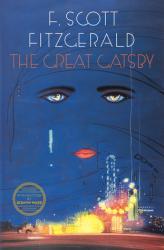
The classic tale of "The Great Gatsby" follows Nick Carraway, a newcomer to the city, who discovers the lavish and intoxicating life of Jay Gatsby, his next door neighbor. Nick soon becomes entangled in a net of secrets and deception that involves his friends Daisy Buchanan and her husband Tom. After hearing so many incredible things about "The Great Gatsby", I came into the story with high expectations. Unfortunately, they were not really met. While the story is undeniably powerful, it lacks in some areas. I found all the characters extremely unlikable. There was no one to really root for. In addition, there were parts of the story that seemed to drag on for far too long. I found myself asking, "When is something going to happen?" at several points. All in all, I didn't hate this story, but it definitely wasn't my favorite classic to read. Grade 12.
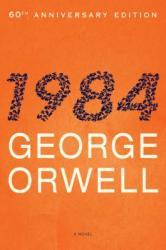
1984 is a timeless classic about a dystopian future where war is constant and you are constantly watched and carefully studied by an ominous force called the Thought Police. Everyone is expected to completely devote themselves to The Party (the ruling government) and believe everything they say. If the Thought Police detects the slightest amount of dissonance in a citizen, they disappear and, according to The Party, cease to exist - and never existed. One party member, Winston Smith, has been rebelling against the Party in thought only for years. Now, he finally gets enough courage to stand up for what's right. Will Winston be able to stop the tyrannical rule of The Party or will it all be in vain? Find out in 1984!
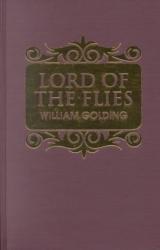
A group of boys are stranded on an island after a plane crash. With no adult supervision, the boys are free to do whatever they want. At first this is something to celebrate. However, as their time on the island grows, the boys learn the challenges of staying alive. Eventually, some of the boys become complete savages and complete chaos reigns the island.
Lord of the Flies is full of symbolism and is at some points very difficult to understand. To follow the story, much inferring is necessary along with a fairly advanced vocabulary. I personally did not enjoy the story very much.
However, some readers may disagree. I do not recommend this book for anyone that is younger than high school.
Reviewer Grade:9
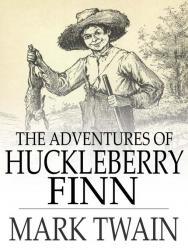
Huckleberry Finn is a rebel against school, church, and the respectable society that wants to civilize him. Therefore, after faking his own death, Huck embarkes on a raft journey down the Mississippi River along with Jim, a runaway slave. The Adventures of Huckleberry Finn is a novel full of shenanigans, adventures, schemes, and pranks in addition to deep contemplation that gives some great advice. This adventure is truly a classic and I highly recommend it for any middle schooler or older since there is something in this book for all ages.
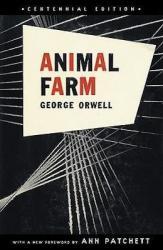
Animal Farm is a dystopian novel about a farm overrun by the farm animals. The animals revolt and create their own hierarchy, which poses an overarching metaphor for humanity. Like many of Orwell’s books, this book exposes the flaws of mankind in an allegorical manner. I chose this book for its dystopian nature, and it did not disappoint. It is artful in its satire, and Orwell takes a clear stance on tyranny. This is among the best dystopian books I have read.
Reviewer Grade: 12
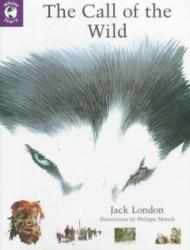
I chose to read this book because it was cheap at the bookstore, and I am so glad that I read it. I have not read many realistic adventure books, but it is my new favorite genre. The Call of the Wild centers around a hard-working, strong dog named Buck who is tragically sold into hard labor. This book evokes sentiments from utter despair to immense joy, and Jack London’s writing style is simple yet eloquent. I strongly recommend this book to everyone.
Reviewer Grade: 12
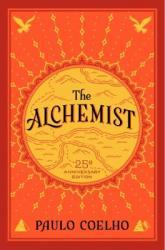
To be honest, I only really bought this book because it came heavily recommended from the manager of the bookstore I was at. He claimed it was a book you could read over and over again, and get a new message from every time. But about a quarter of the way through, I admitted to myself it was an average book. It didn't have spectacular or eye-opening writing, and the plot was okay I guess. Essentially, it's about a young shepherd who meets a 'king' in a marketplace in Spain. The king convinces him that there is a Personal Legend everyone has in this world, and the universe conspires to help you achieve it. All throughout this book, Santiago (the shepherd) follows omens, prophecies, and recurring dreams in the hopes of finding a treasure by the Egyptian pyramids. On the way, he helps a crystal merchant, meets an English man who aspires to be an alchemist, the love of his life, and eventually the alchemist himself. In the end, he finds himself, the woman he loves, the treasure of a forgotten pirate (cliche! Boo!), and he accomplishes his Personal Legend. It was okay, but really generic writing and not a very interesting plot. Who knows? Maybe the message will change when I read it again. But I rather doubt it.
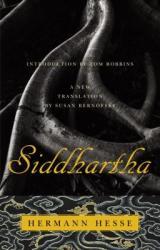
Siddhartha is a tale of a young man who lives many different lives, from a Brahmin's son to an ascetic to a wealthy merchant. He does this all to find inner peace, or nirvana. I liked this book because of its style of narration. I have learned about Buddhism before from textbooks, but this style of information is so much more interesting. Siddhartha has many character flaws, but he eventually manages to wash them away in the cycle of time. Reading this book is a very introspective experience that everyone should have.

The Great Gatsby is a classic set in the Roaring Twenties. It exposes the flaws in the very ideals that built America--wealth, beauty, and the American Dream. The tone of this book is despondent, and every character is tragic in one way or another. Indeed, this is a book of many emotions, some even gut-wrenching. My favorite aspect of this book is how Fitzgerald uses fiction to talk about very real issues. I strongly recommend this book.




